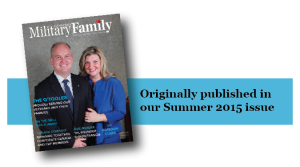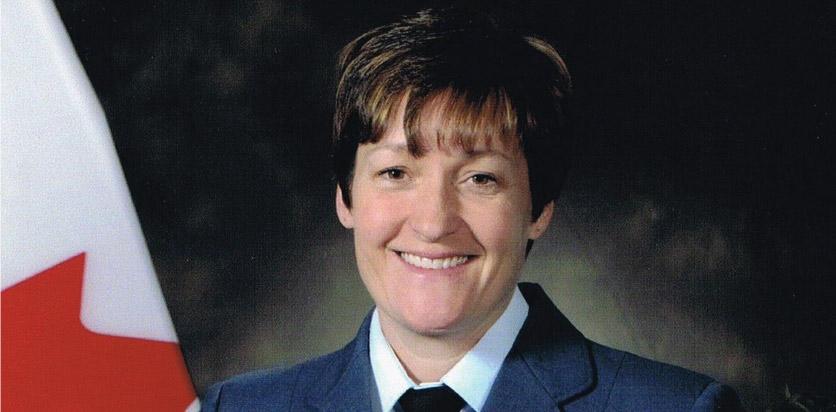Best of CMF Magazine
It’s Never Too Late
There comes a time, for those of us in the Canadian Armed Forces (CAF), when our career path stalls or loses its appeal. It is at that time we must decide whether to change military trades or retire in pursuit of other opportunities. When faced with that choice, our anticipation of a new career path can be exciting. Whatever we choose, even with support, following that path can be frightening and overwhelming.
For Blair Hicks, who was an Air Combat System Operator, that time came in 2010. After serving 20 years in the Air Force, she decided it was time for a change. In 2009, she applied to the Canadian Forces subsidized legal officer training (MLTP – Military Legal Training Plan). This program had candidates apply concurrently to several Canadian
law schools. Hicks made the shortlist, unfortunately due to the limited military positions she was not accepted. However, Hicks did gain acceptance into law school at the Western University of London, Ontario where she started her path to becoming a lawyer in September 2010, something she had wanted to do for awhile.
 “I had been looking at law school for a long time, even before I had an undergraduate degree. I was ready for a career change, inside or outside the military,” Hicks explains. “I was sure a law degree would open doors and set me up so I could continue working for another decade or two, which is still the plan.”
“I had been looking at law school for a long time, even before I had an undergraduate degree. I was ready for a career change, inside or outside the military,” Hicks explains. “I was sure a law degree would open doors and set me up so I could continue working for another decade or two, which is still the plan.”
For her, the transition was straightforward. Yet, after 21 years, parting ways with the military was emotional. She loved her career and felt fortunate to have been a part of the air force community. She that was exciting. She loved her career and felt fortunate to have been a part of the Air Force community. It was difficult to leave the the familiarity of the uniform, her friends, the structure, the sense of community and the mission knowing she could not go back. The demands of law school were enormously helpful in her transition. Blair was quickly consumed with a demanding new passion that served her well as a distraction from any sense of loss. “To be truthful, when I lifted my head again to lament the loss, or wrap my brain around the transition, I’d finished eight months of law school.” Working on something new and challenging took away much of the sting she was feeling about what she was leaving behind. When asked “Why Law”? Her reply was “I had been looking at law school for a long time, even before I had an undergraduate degree. I was ready for a career change, inside or outside the military. I was sure a law degree would open doors, and set me up so I could continue working for another decade or two, which is still the plan.
When I went to law school, I was not necessarily so focused on opening a practice. However, once I learned more about the profession, I knew private practice was a good fit. It is a line of work where you can make a significant difference in your community, and I find the academic side of the law interesting”. Leaving the comforts of the military and returning to school especially as a mature student can be overwhelming. For many it has been years since textbooks have been opened. We may also feel the alienation of a significant generation gap. Blair, a mature student, had been there before and faced the challenge head on. “I was a mature student most of my adult life. I finished my undergraduate while serving and graduated in 2003 from the University of Manitoba. I was used to being in a classroom full of young people. Nothing, however, could have prepared me for law school with the 20-something crowd. Law school was exciting, but it was high-energy, competitive, and there were many days where I felt isolated. The flip side, there were mature exciting, but it was high energy, competitive, and there were many days where I felt isolated. students and several in their 40s. I think it is common theses days to see a mix of older students in any academic program. I made some good friends over the three years, including one from the 20-something crowd that I still stay in touch with.” Blair offers this advice for those returning to school or heading down new career paths. “I would tell someone not to let their age hold them back. People return to school at all ages. Fifty is the new 40; 40 is the new 30. I think that cliche is true. I will not pretend there weren’t times when I felt enormously conspicuous because of my age, but from the beginning I tried to focus on what I was doing and how rewarding it was.
When considering opportunities, remember, the years are going to fly by no matter what, and they might as well be following something that’s right for them. I would also tell service members not to underestimate the value of their military experience. Last, I would say don’t let fear, fear of anything, keep you from taking a chance.” Blair’s goals were modest and continue to be so. She enjoys leaving the transience of military life and staying in one community, being with her family. She graduated in June 2013 with a JD (Juris Doctor) and energetically started her estate planning practice last fall. Blair Hicks, Major (ret’d) currently lives in Kingston with her husband who continues to serve in the Canadian Armed Forces. Committed to her work, she provides her clients with a convenient, professional, and affordable mobile estate planning and notary service. To reach Blair for a consultation go to her website, www.blairhicks.lawyer or email her at [email protected]. For information on education and career planning, contact your local Personnel Selections Officer.
Lee Jarratt currently serves as a Construction Engineering Officer in the Canadian Armed Forces. She and her husband have been posted to Garrison Petawawa for the past three years.









